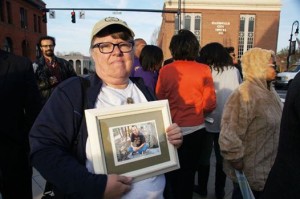
Leslie Boyd holds a picture of Mike, lost at 31 from cancer and denied health care due to a pre-existing condition. Photo by Jessie Swink
Leslie Boyd has more than enough reason to be spreading information about the Affordable Care Act all across North Carolina.
“One of the reasons we’re so avid about [the Affordable Care Act] is because I lost my son from a lack of health care,” she starts her story.
If her son, Mike Danforth, had just had health care when he was originally diagnosed with cancer, he might not have been denied coverage when the disease progressed due to a pre-existing condition. Instead, it meant paying roughly a million dollars to provide chemotherapy treatment that would be too little and too late.
Now Boyd works for WNC Health Advocates, a program that seeks to educate people on aspects of the Affordable Care Act, even as far as helping individuals to register for health care. They offer assistance to those with pre-existing conditions, like psychiatric illnesses, diabetes, cancer, and HIV/AIDs by accompanying people to doctor appointments and checking in with them throughout their treatments. The Start From Seed is also one of their projects, where support is offered to low-income women and families in Buncombe county.
Though sign-up for the ACA has ended, the results from people seeking coverage were fairly high. Over 8 million people signed up through state and federal exchanges through April 19 and around 2.2 million people between 18 and 34 years old sign up for coverage. The downside is that not all insured Americans have plans that meet the criteria set by the Affordable Care Act, and 5.7 million people will still be uninsured through 2016 in the US because 24 states have yet to expand Medicaid.
The Affordable Care Act is now in place to provide coverage to those with pre-existing conditions, like Mike, whose treatment delays cost him his life.
But many citizens don’t understand the new procedures brought about by the Affordable Care Act, and a muddled pool of misinformation is a lot for most to wade through.
The most important thing to understand about the Affordable Care Act is that people must have some form of health care. Those without healthcare will be subject to a tax penalty, unless they qualify for an exemption. The plan must satisfy certain requirements, and the best way to learn whether or not a plan fits those requirements is by visiting HealthCare.gov, where individuals could sign up for ObamaCare and learn more about the program. The website also provides a place to compare different types of healthcare.
“It’s very important that people get coverage,” Boyd said. “Medicaid hasn’t been expanded, and half a million people in North Carolina this year won’t get coverage. About 3,800 of those people will die from lack of health care.”
One of the biggest complaints about the Affordable Care Act is the tax penalty that will be imposed on those who choose to opt out of health care. This is the result of health care now being a requirement for all United States citizens, but it only applies to those making more than $11,000 a year.
What has changed is that healthcare is now more readily available to individuals such as low-income earners and students. Before the Affordable Care Act, individuals in the age range of 18 to 34 were averaging as twice as likely to not have health care. Now those with low income can opt in for more affordable healthcare using the newer system, and as long as someone is a student, they can be added to their parent’s health care until they are 26.
“I haven’t been impacted by the Affordable Care Act directly, because I’m still on my parent’s insurance, and they have private insurance. If I wasn’t, I would probably have health care through that system,” WCU student, David McLaughlin, said.
Finding insurance can feel like a daunting task upon graduating as well, since they will no longer be applicable for their parent’s insurance either. Healthcare.gov has made many students feel more comfortable about seeking their options in the future, but even though many young adults feel more comfortable with the Affordable Care Act and the new options it offers, not all of them are completely satisfied.
“Overall, I like it, but I don’t think it goes far enough,” Brooke Banner, a recent college graduate, said. “I think everyone should have free healthcare regardless of everything else, even if it means taxes are a bit higher. It would be nice to still have people able to get private insurance. Sort of like schools. No matter what, you’re paying taxes to send kids to public school, even if you don’t have kids or are sending kids to private schools.”
There is still outright opposition to the act as well, with some people feeling as though it shouldn’t personally impact them, and that their decisions about their healthcare should remain a private decision, rather than a decision imposed on them by the government.
“If they had left it at insurance having to cover pre-existing conditions, I would have been fine with it,” Dusty George, another senior, said. “But telling me what I should and shouldn’t do with my private decisions feels like an overreach of the government.”
While students may be torn about how to feel about the Affordable Care Act, it’s still a mandatory requirement for all United States citizens. ACA will continue to make the news, with both support and opposition voicing their opinions on how involved health care should be. In an election year we will certainly hear plenty on both sides of the political aisle.
Related stories:
Huffington Post: Numbers tell the story of ACA’s success, but they also show millions are missing out



